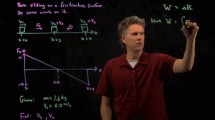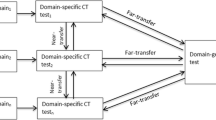Abstract
We report on a study of what happened when we recycled a conceptual examination question in a first-year university physics course. The question, which was used for three consecutive years, asked about an astronaut's experience of weighing in an orbiting space-craft. Our original intention was to use a phenomenographic approach to look for differences in students' descriptive answers. Having done that, we decided to add a study of the marks that were awarded to those answers. The first time that the question was re-used, the distribution of answers amongst our phenomenographic categories showed a decrease in the common conception that gravity is zero in the satellite and an increase in explanations in terms of free fall. When the question was re-used a second time, that difference was maintained but it was not significantly increased. The distribution of marks for the question was different over the three years in a way that appears to be unrelated to differences in students' conceptual understandings. Differences in the distribution of marks are more likely to be related to differences in marking procedures. We conclude that studies like this one have the potential to contribute to improvements in university assessment procedures. In particular we propose that phenomenographic analysis could be used in the design of marking schemes.
Similar content being viewed by others
References
Biggs, J. (1999). Teaching for quality learning at university. Buckingham, UK: SRHE & Open University Press.
Chi, M. T. H., & Bassok, M. (1989). Learning from examples via self-explanations. In L. B. Resnick (Ed.), Knowing, learning, and instruction: Essays in honor of Robert Glaser (pp. 251–282). Hillsdale, NJ: Lawrence Erlbaum Associates.
Chi, M. T. H., Bassok, M., Lewis, M. W., Reimann, P., & Glaser, R. (1989). Self-explanations: How students study and use examples in learning to solve problems. Cognitive Science, 13, 145–182.
Entwistle, N., & Entwistle, D. (2003). Preparing for examinations: The interplay of memorising and understanding, and the development of knowledge objects. Higher Education Research and Development, 22(1), 19–41.
Galili, I. (1995). Interpretation of students' understanding of the concept of weightlessness. Research in Science Education, 25, 51–74.
Galili, I. (2001). Weight versus gravitational force: Historical and educational perspectives. International Journal of Science Education, 23, 1073–1093.
Galili, I., & Bar, V. (1997). Children's operational knowledge about weight. International Journal of Science Education, 19, 317–340.
Galili, I., & Kaplan, D. (1996). Students' operations with the weight concept. Science Education, 80(4), 457–487.
Gunstone, R. F., & White, R. T. (1980). A matter of gravity. Research in Science Education, 10, 35–44.
Gunstone, R. F., & White, R. T. (1981). Understanding of gravity. Science Education, 65, 291–299.
Halliday, D., Resnick, R., & Walker, J. (1997). Fundamentals of physics, Extended (5th ed.). New York: Wiley.
Iona, M. (1975). The meaning of weight. The Physics Teacher, 13(5), 263–274.
Marton, F. (1981). Phenomenography – describing conceptions of the world around us. Instructional Science, 10, 177–200.
Marton, F. (1986). Phenomenography – A research approach to investigating different understandings of reality. Journal of Thought, 21, 28–49.
Marton, F., & Säljö, R. (1976). On qualitative differences in learning: I – Outcome and process. British Journal of Educational Psychology, 46, 4–11.
Prosser, M., & Millar, R. (1989). The How and What of learning physics. European Journal of Psychology of Education, 4, 513–528.
Prosser, M., & Trigwell, K. (1999). Understanding learning and teaching, The experience in higher education. Buckingham, UK: SRHE & Open University Press.
Ramsden, P. (2003). Learning to teach in higher education (2nd ed.). London: Routledge Falmer.
Sharma, M. D., Cole, M., Whymark, A., Millar, R. M., & Smith, A. (2002). On the repeated use of well designed conceptual problems in summative assessment tasks. In Proceedings of the 15th Australian Institute of Physics Congress, Sydney (pp. 259–261).
Sharma, M. D., Millar, R., & Seth, S. (1999). Workshop tutorials: Accommodating student centred learning in large first year university physics classes. International Journal of Science Education, 21, 839–853.
Sharma, M. D., Millar, R. M., Smith, A., & Sefton, I. M. (2004). Students' understandings of gravity in an orbiting space-ship. Research in Science Education, 34, 267–289.
Author information
Authors and Affiliations
Corresponding author
Rights and permissions
About this article
Cite this article
Sharma, M.D., Sefton, I.M., Cole, M. et al. Effects of Re-Using a Conceptual Examination Question in Physics. Res Sci Educ 35, 447–469 (2005). https://doi.org/10.1007/s11165-005-5114-1
Issue Date:
DOI: https://doi.org/10.1007/s11165-005-5114-1




